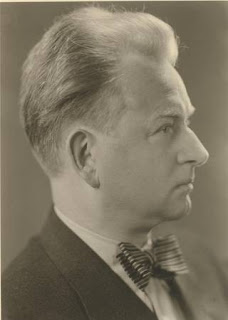 |
| Prof. Dr. Hermann Jahrreiss |
This authority gained through no law and only through military force is already refuted at its foundations in the pleading about international law by Professor Jahrreiss. As we have stated, Dr. Jahrreiss explicitly professes on behalf of the German defense-team the exalted purpose of fulfilling a primordial longing of humanity and, through an expanded international law, securing a just and enduring order of peace. Two preconditions however would first have to be met:
1. These new laws should not nullify their own legality by being applied retroactively and one-sidedly.
2. A supranational authority must first be created that can function as a world-legislature and world-executive.
For, as long as these conditions cannot be fulfilled, no court may claim the right to convict and to punish persons affiliated with a state or a government for a crime against peace.
According to recognized international law the breach of a political treaty is also nothing other than a violation of international law. The treaty-breaking state has committed a tort under international law (Völkerrechtsdelikt), but not a crime (strafbare Handlung).
Therefore, Jahrreiss demonstrates, there was no international criminal law until then.
Even if the German Reich in 1939 had violated a non-aggression pact — which in the case of Poland was no longer possible, since the relevant treaty had been terminated — even in this case Germany would have committed, and therefore under the rules of international law would have been liable for, only a tort:
“But only the Reich, not the individual, even if he were the head of state. This is beyond all doubt according to presently recognized international law.” [Hermann Jahrreiss, “The Breach of Peace between States and its Culpability,” IMT transcript, Supplement B, Part 1, II]
Professor Jahrreiss then thoroughly substantiates this position through the historical facts of the period after the First World War:
“For up to the most recent times not even the possibility was mentioned, either in the Manchurian, or in the Italo-Abyssinian, or in the Russo-Finnish conflict, of instituting criminal proceedings against those people who were responsible, on the Japanese, Italian, or Russian side, for planning, preparing, launching, and conducting the war or who simply participated in these acts in any way. And it was certainly not because matters had, paradoxically enough, not been thought out to the end, that they were not prosecuted. They were not prosecuted because this cannot take place as long as the sovereignty of states is the organizational basic principle of interstate order.” [Hermann Jahrreiss, IMT transcript, 4 July 1946]
The state would have to surrender the most consequential event in the state’s life, the decision for war or peace, to foreign states or to an international body.
The state would necessarily in effect dissolve itself, if it would have the question of its existence decided by others. The Nuremberg “laws” are only applicable if the sovereign state is already smashed.
Professor Jahrreiss indicates to the court this sequence of actions:
The Prosecution breaks up in its own mind the German State at a time when it stood upright in its full strength and acted through its organs. It must do so if it desires to prosecute individual persons for a breach of the peace between states. It must turn the defendants into private individuals. [Hermann Jahrreiss, ibid.]
With what do the Allied judges want to replace the state? Even now, states are the only subjects of international law. Where is a supranational authority that had already taken their place in 1939? Professor Jahrreiss holds this crucial fact against the tribunal:
“The regulations of the Charter deny the basis of this law*; they anticipate the law of a world state.” [Hermann Jahrreiss, ibid.]
Against this legal-scientific and legal-philosophical criticism from the most important German expert on international law, the Allied jurists can offer only their old excuses and slogans. At the close of his pleading, Professor Jahrreiss again summarizes his defense of international law against international despotism (des Völkerrechts gegen internationale Willkür) — cautious in form, but unambiguous in substance:
“Sentences against individuals for breach of the peace between states presuppose other laws than those in force when the actions laid before this Tribunal took place.
“The legal question of guilt — and I am here only concerned with that — is thus posed in its full complexity, for not one of the defendants could have held even one of the two views of the legal world constitution, on which the chief prosecutors base their arguments.” [Hermann Jahrreiss, ibid.]
___________________________________________
* The argument is a little clearer in German. The usual term for international law is Völkerrecht, which literally means “law of peoples” or “law of nations.” Obviously there cannot be a “law of nations” unless there are nation-states. Nation-states are therefore the basis for international law.
